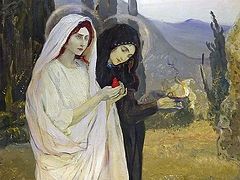The third Sunday after Pascha is dedicated not to the apostles or any famous saints glorified for their great works and podvigs, but to the most ordinary women, whose stories and service are contained in no more than a few Gospel lines. These women unwaveringly followed their beloved Teacher and carried out ordinary, routine women’s work, well known to any modern housewife: They did laundry, cleaned house, prepared food, and bought all the necessities. Amongst them was Mary called Magdalene, out of whom went seven devils, and Joanna the wife of Chuza Herod’s steward, and Susanna, and many others, which ministered unto him of their substance (Lk. 8:2–3). Joanna, the wife of Herod’s steward, served her beloved Teacher with her wealth; it is she who saved the head of St. John the Forerunner, who was executed at Herodias’s instigation, and preserved it on the Mount of Olives. Maria of Cleopas, a relative of Christ, was supposedly the wife of Cleopas, the brother of Joseph the Betrothed. About Susanna we know only that she served Christ of her substance; that is, she was a wealthy woman who helped the apostles with money. And Mary Magdalene was also glorified for her labors as equal-to-the-apostles. As we know from the Gospels, for her fiery faith the Risen Lord appear first to her.
Their service to Christ differed little from what they did at home, but the Church glorifies them equally with the apostles and wonderworkers. Moreover it was not to the apostles and ascetics that the greatest mystery of the new faith was revealed—the Resurrection of Christ—but to these simple women, who quietly fulfilled their humble, artless service.
The day of the Myrrh Bearing Women is the triumph of women’s sacrificial, uncritical love over pragmatic male reason. Leading up to that day were the most sorrowful and frightening circumstances in the life of the Church that was being born. The Teacher was crucified, the apostles scattered, and the Body of Christ was hidden in a tomb, sealed with a huge stone attended by an armed guard. What would the men have done in a similar situation? They would have gone to find their comrades and armed themselves to the teeth in order to overtake the guards. And they would have brought along some tools to roll the huge stone away from the tomb. But there were no men around—the men had forgotten about bravery and duty and simply ran away, and these ordinary, weak women simply knew, that they had to go and anoint the Body of their beloved Teacher with precious myrrh. All the rest was of little interest to them. They went and discussed amongst themselves: “Who will roll the stone away from the tomb for us?” And not finding an answer, they just believed in their womanly way that it would somehow come out all right.
Any man who might have found himself in their company would have gotten weary of trying to call them to reason and lose his mind. But they simply believed and went. And when they arrived at the tomb, the guard turned out to be sleeping, the stone rolled away, and on the tomb was sitting... an angel, who told them to run and tell the apostles about the great tidings that their Teacher has Risen. And this supremely important news of our faith was purchased with unshakeable women’s love, which turned out to be greater than all the male logic and wisdom in the world! On this day the world learned that true love is unreasoning—it is above reason. To burning love and the unreasoning heart were revealed the Heavens and all the mysteries of the universe, and this heart belonged to ordinary women.
The day of the Myrrh Bearing Women reveals to us the heights of everyday women’s service, which we men often do not even notice. After all, the quiet domestic work of any woman on earth has acquired on this day an unprecedented great and universal significance. In the epistle of the apostle Peter are these remarkable words, which speak of this directly:
Likewise, ye wives, be in subjection to your own husbands; that, if any obey not the word, they also may without the word be won by the conversation of the wives; while they behold your chaste conversation coupled with fear (1 Pet 3:1–2).
Our grandmothers who arise in the deep dawn in order to bake pies for their beloved grandchildren and are ready to give us their last, are myrrh bearers. Our mothers who stood day and night at our bedside when we were sick, rejoiced at our tiniest successes, and prayed for us when we didn’t succeed, are myrrh bearers. Our wives fatigued from work, forgetting themselves as they hurry home to fix us dinner and wash our socks, are podvizhnitsi [laborers in asceticism]. Their boundless sacrificial love, patience, and humble everyday bearing of their cross makes our hectic, sick lives deformed by passions brighter and better; and the only thing we can do is to be loving, caring, and infinitely grateful.





